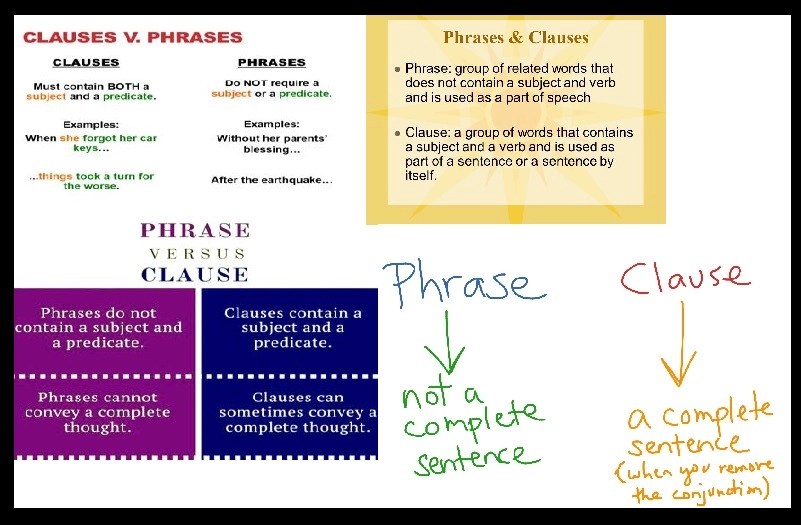
Phrases and Clauses is as important as any topic in English language. It is used in our everyday communication with one another. Before a definition of the Phrase is given, it is important to look at some expressions considered as examples of phrases and characteristics or features of the phrase.
Example of Phrases
- In the room
- The girl is beautiful
- To read without light
- In order to pass the examination
- Reading without light
- Passing the examination
- The broken bottle
- The boiled yam
Features of Phrases
- A phrase is a group of words e.g. the beautiful girl.
- A phrase does not make sense e.g. in the room.
- A phrase may not have any verb e.g. on the table.
- If there is a verb present in a phrase, the verb is always and must be a non-finite verb, e.g. To read without light, Reading without light, The boiled yam.
- A phrase only forms part of the sentence. In other words, none of the examples given above can stand on its own. Other expressions must be added to them to have a complete and meaningful sentences.
Examples:
- I saw a woman in the room.
- To read without light is not easy
- He told me to replace the broken bottle
- Passing the examination involves hard work.
Having given some examples of phrases, now we will look into the definition of a phrase.
From the examples and features of the phrase already given, we can practically define what a phrase is in a sentence.
Phrase: Definition of a Phrase
A phrase can be defined as a group of words (with or without a non-finite verb) that does not make sense and which only forms parts of a sentence.
Note: The issue of finite and non finite verb is the major factor that distinguishes the phrase from the clause. Therefore, for an expression that has a verb to be identified as a phrase, a candidate must establish the following:
a) If the verb in the expression given is preceded by ‘to’, it means the verb is non-finite, therefore, the expression is a phrase.
Example: To pass the examination involves hard work.
b) If the verb in the expression given is in the – ‘ing’ form, the verb is non-finite, hence the expression is a phrase.
Example: Giving to the poor attracts God’s blessing.
c) If the verb in the expression given is made to function as an adjective, it is a non-finite verb and expression is a phrase.
Example: He told me to replace the broken bottle.
Note: ‘broken’ is a verb (past participle of break), but in the sentence above, it is qualifying the noun ‘bottle’, which is the function of an adjective.
Types of Phrases
There are three (3) types of phrases, namely:
- Noun phrase
- Adjectival phrase
- Adverbial phrase
I’ll explain the three types of phrases listed above with individual examples for proper understanding.
Noun Phrase:
In a noun phrase, the head word must be a noun or pronoun. A noun phrase can be replaced by a pronoun.
Examples:
- I saw the village headmaster
- The man at the gate is my father
- The old woman sleeping in the room has just been discharged from the hospital.
- Sola told me to replace the broken bottle.
- I gave the money to the most brilliant student in class.
- To sleep without light is frightening.
Functions of Noun Phrase
Like noun, noun phrase has five (5) different grammatical functions.
1) Subject of Verb: When the noun phrase occupies the first position in the sentence , it functions as the subject of the verb that follows it.
Examples:
i) Sleeping without light is not something i enjoy
Function: subject of the verb, ‘is’
ii) The beautiful girl comes here everyday.
2. Subject Compliment: When the noun phrase 1S the same thing or person as the subject. it functions as subject complement.
Examples:
(i) Olu is the doctor ( the doctor is the same person as Olu).
iii) Object of the Verb: When the noun phrase comes after a verb in the sentence, it functions as object of the verb.
Examples:
(i) I gave the money to the best student.
– ‘the money’ is the object of the verb ‘gave’
(ii) Akpan received an award for excellence.
– ‘an award’ is the object of the verb, ‘received
4) Object Complement:
When the noun phrase follows the object. it functions as the object complement.
(i) I gave Sola the money.
the money completes the meaning of Sola (object of the verb. gave’). Therefore it functions as the object complement.
(ii) They called the former ruler a tyrant
5. Object of a Preposition:
When the noun phrase occurs alter a preposition, it is governed by the preposition. Hence, it is the object of the preposition.
i) Award of excellence was given to the Zonal Manager.
-‘the Zonal Manager’ functions as the object of the preposition, to
ii) The man sees beyond the ordinary.
– ‘the ordinary’ functions as the object of the preposition “beyond’.
Adjectival Phrase:
Examples:
(ii) The man standing at the gate is my father.
Function: It qualifies the noun, ‘man’.
(ii) The student to be suspended has stopped coming to school.
Function: It qualifying, the noun, ‘student.
(c) Adverbial Phrase:
An adverbial phrase modifies the verb in the main clause. It indicates time, place, manner, frequency, degree, result of action, condition. purpose and reason for an action.
i) I put the food on the table (answers the questions ‘where?’)
Function: modifies the verb, ‘put’.
ii) He carries on as the boss (manner).
Function: modifies the verb, ‘carries’
iii)T he student comes to school fwice a week.(frequeney).
Function: modifies the verb, ‘comes”.
iv) He will travel to Ibadan after the interview (time).
Function: modifies the verb, ‘will travel”.
v) He studies hard in order to pass (purpose).
Function: modifies the verb. ‘studies.
CLAUSE: Definition of Clause:
A clause is a group of words, with a finite verb forming part of the sentence
Types of Clauses
There are two types of clauses-main or independent clauses and sub-ordinate or dependent clause.
(a) The Main Clause
This can stand on its own to make a complete sense or sentence.
Examples:
i) I am going home now.
ii) The choir came and ministered
(b) Sub-ordinate or Dependent Clauses
Features of Sub-ordinate Clauses
i) It is a group of words.
ii) It always has a finite verb (see finite and non-finite verbs).
iii)1t does not express a complete thought, it needs the main clause to make a complete sense or sentence
iv)It only forms part of the sentence.
Examples of sub-ordinate clauses are:
i) As soon as the boy saw the teacher, he took to his heels.
ii) Unless he passes the examination, he will not travel abroad.
iii) How he knew my name still remains a mystery
iv) The landlord whose house was burgled has reported to the police.
TYPES OF SUB-ORDINATE CLAUSES
- Noun clause
- Relative clause
- Adverbial clause.
(a) Noun Clause and Functions
1. Subject of the Verb
Examples:
i) How Sola passed the examination beats the imagination of her teachers.
Function: Subject of the verb, ‘beats
ii) Why he has refused to put in his letter of resignation is best known to him
Function: Subject of the verb, ‘is known’
2) Subject Complement
Example;
3. Object of the Verb
Examples
i) The authority awarded what is termed punctuality award
Function: Object of the verb, ‘awarded
ii) The suspect eventually accepted that he was guilty.
Function: The object of the verb, ‘accepted
iii)The human rights activist explained why he was arrested by the police
Function: Object of the verb, ‘explained
4. Object Complement
Examples:
i) The authority gave the student what is termed award for excellence
Function: Complement of the object, ‘students
ii) The robber killed the man because he did not give them what they demanded for.
Function: Complement of the object, ‘them’.
iii) We narrated to our colleagues how we survived the ordeal.
Function: ‘our colleagues’ is the object of the verb, ‘narrated’ and the italicized noun clause – “how we survived the ordeal’ complements the object ‘our colleagues’.
5. Object of preposition
Examples:
i) His action resulted into what his father predicted
Function: object of the preposition, ‘into’
ii) The money was retrieved from the man who stole it.
Function: object of the preposition, ‘from’.
(b) Relative Clause and Functions
A relative clause is usually introduced by relative pronouns like who. which, whose, that, when, where, whom, etc.
The function of a relative clause is the same as that of an adjectival phrase: This is qualifying the noun and pronoun that precedes it in a sentence.
Examples:
i) I released the project to somebody who appears to be reasonable in the class.
Function: qualifies the pronoun ‘somebody’
ii) The landlord whose house was burgled has reported to the police.
Function: Qualifies the noun landlord
i) The dress which my husband bought for me suits my shape
Function: qualifies the noun, ‘dress
ii) The government has equipped the hospital where the renowned doctor works.
Function: qualifies the noun. “hospital.
c) Adverbial Clause and Functions
Like the adverbial phrase, adverbial clause performs the grammatical function of modifying the verb in the main clause.
Consider the following:
As soon as the student saw the principal he took to his heels
Function: It is modifying the verb, ‘took in the main clause – he took to his heels’
Adverbial clauses are indicators of
a) Time (when. after, as soon as, before. whenever, while, since etc.)
b) Place (where. wherever etc.)
c) Condition (unless. if, until, provided)
d) Manner (as if. as etc.)
e) Reason and purpose because, in order that, so as, so that etc.)
f) Concession (though, yet, although etc.)
g) Result ( that)
Note: In an examination situation, candidates are not required to give the name of a particular adverbial clause
For instance. an adverbial clause introduced by, as soon as, before, when or whenever is an adverbial clause of time. However, it is enough for candidates to just identify such a clause as an adverbial clause only.
Functions of Adverbial Clause
Examples:
i) The manager had left for the meeting before I got to his office.
Function: modifies the verb, ‘had left’.
ii) Although he was told the implications of examination malpractices, he brought prepared answers into the hall.
Function: modifies the verb, ‘brought’.
iii) Akin failed his final examination because he did not study hard
Function: modifies the verb, ‘failed’.
iv) Unless you buy me a bottle of coke, I will not accompany you to the market.
Function: modifies the verb. ‘will not accompany
(v) I was so tired that I could not eat after cooking.
Function: modifies the verb ‘was tired’.
(vi) The old man remembers his childhood whenever he sees his grandchildren.
Function: modifies the verb. ‘remembers’
(vi) I saw him when he was going to church
Phrases and Clauses in English language is a very important topic that comes out in WAEC and NECO SSCE every year. In fact if you check the topics that come out most in English language in WAEC and NECO exam, this topic (Clauses and Phrases) is listed in it. This goes a long way to speak about the use of clauses and phrases in our everyday communication.
Studying and carefully practicing the examples in this post will guaranty you a very good mark under this section in English language be it JAMB, WAEC, NECO or any other certification exam where English language is compulsory.



